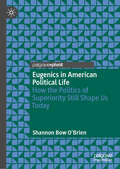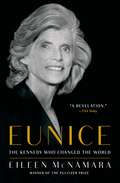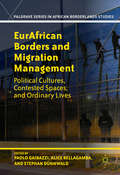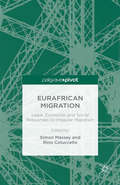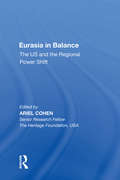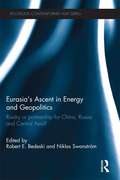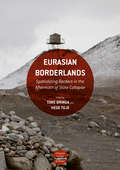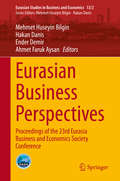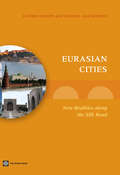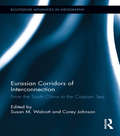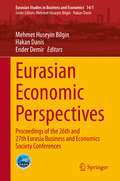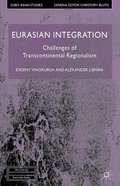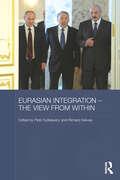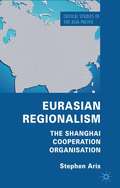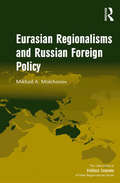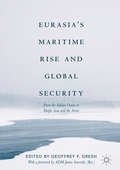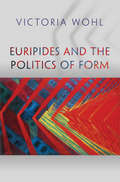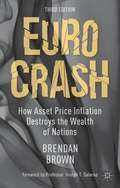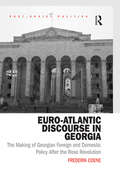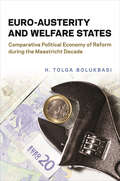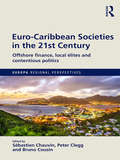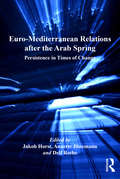- Table View
- List View
Eugenics in American Political Life: How the Politics of Superiority Still Shape Us Today
by Shannon Bow O'BrienThe book explores the development of the American eugenics movement and how it still plays a role in American life. Building on a brief overview of the concept of eugenics, Shannon Bow O’Brien charts the foundations of the ideas, significant influences, and influencers of the movement in the last 19th and early 20th centuries. She discusses how these ideals and social life shaped American culture and encouraged attitudes toward racial and ethnic biases, including immigration policies in that period. O’Brien examines how the founding of the United States of America was built on unwanted individuals from the United Kingdom; transported felons and indentured servants were many of the original colonists. As the population forged its new nation, many of these individuals were the focus of restrictive immigration policies that sought to amend the identity of the American citizen and sought to define acceptable roles for Black persons within American society. Faithful slave monuments provided physical models to help engrain these roles within American life. O’Brien traces the development of the Mammy statue movement and its intersectionality with the restrictive immigration laws. Finally, she turns to the rhetoric of Donald Trump and contextualizes his speech in the ideology of the superiority of White Nordic nativism within American life.
Eunice Hunton Carter: A Lifelong Fight for Social Justice
by Yun Li Marilyn Greenwald2022 PROSE Awards Category Winner - Biography & AutobiographyForeword INDIES Book of the Year Awards - 2021 BRONZE Winner for BiographyThe fascinating biography of Eunice Hunton Carter, a social justice and civil rights trailblazer and the only woman prosecutor on the Luciano trial Eunice Hunton Carter rose to public prominence in 1936 as both the only woman and the only person of color on Thomas Dewey’s famous gangbuster team that prosecuted mobster Lucky Luciano. But her life before and after the trial remains relatively unknown. In this definitive biography on this trailblazing social justice activist, authors Marilyn S. Greenwald and Yun Li tell the story of this unknown but critical pioneer in the struggle for racial and gender equality in the twentieth century.Carter worked harder than most men because of her race and gender, and Greenwald and Li reflect on her lifelong commitment to her adopted home of Harlem, where she was viewed as a role model, arts patron, community organizer, and, later, as a legal advisor to the United Nations, the National Council of Negro Women, and several other national and global organizations.Carter was both a witness to and a participant in many pivotal events of the early and mid– twentieth century, including the Harlem riot of 1935 and the social scene during the Harlem Renaissance.Using transcripts, letters, and other primary and secondary sources from several archives in the United States and Canada, the authors paint a colorful portrait of how Eunice continued the legacy of the Carter family, which valued education, perseverance, and hard work: a grandfather who was a slave who bought his freedom and became a successful businessman in a small colony of former slaves in Ontario, Canada; a father who nearly single-handedly integrated the nation’s YMCAs in the Jim Crow South; and a mother who provided aid to Black soldiers in France during World War I and who became a leader in several global and domestic racial equality causes.Carter’s inspirational multi-decade career working in an environment of bias, segregation, and patriarchy in Depression-era America helped pave the way for those who came after her.
Eunice: The Kennedy Who Changed the World
by Eileen McNamaraIn this &“revelation&” of a biography (USA TODAY), a Pulitzer Prize–winning journalist examines the life and times of Eunice Kennedy Shriver, arguing she left behind the Kennedy family&’s most profound political legacy.While Joe Kennedy was grooming his sons for the White House and the Senate, his Stanford-educated daughter, Eunice, was hijacking her father&’s fortune and her brothers&’ political power to engineer one of the great civil rights movements of our time on behalf of millions of children and adults with intellectual disabilities. Her compassion was born of rage: at the medical establishment that had no answers for her sister Rosemary, at her revered but dismissive father, whose vision for his family did not extend beyond his sons, and at a government that failed to deliver on America&’s promise of equality. Now, in this &“fascinating&” (the Today show), &“nuanced&” (The Boston Globe) biography, &“ace reporter and artful storyteller&” (Pulitzer Prize–winning author Megan Marshall) Eileen McNamara finally brings Eunice Kennedy Shriver out from her brothers&’ shadow. Granted access to never-before-seen private papers, including the scrapbooks Eunice kept as a schoolgirl in prewar London, McNamara paints an extraordinary portrait of a woman both ahead of her time and out of step with it: the visionary founder of Special Olympics, a devout Catholic in a secular age, and an officious, cigar-smoking, indefatigable woman whose impact on American society was longer lasting than that of any of the Kennedy men.
EurAfrican Borders and Migration Management: Political Cultures, Contested Spaces, and Ordinary Lives (Palgrave Series in African Borderlands Studies)
by Paolo Gaibazzi, Stephan Dünnwald and Alice BellagambaThis volume traces the African ramifications of Europe’s southern border. While the Mediterranean Sea has become the main stage for the current play and tragedy between European borders and African migrants, Europe’s southern border has also been “offshored” to Africa, mainly through cooperation agreements with countries of transit and origin. By bringing into conversation case studies from different countries and disciplines, this volume seeks to open a window on the backstage of this externalization of borders. It casts light on the sites – from consulates to open seas and deserts – in which Europe’s southern border is made and unmade as an African reality, yielding what the editors call "EurAfrican borders." It further describes the multiple actors – state agents, migrants, smugglers, activists, etc. – that variously imagine, construct, cross or contest these borders, and situates their encounters within the history of uneven exchanges between Africa and Europe.
Eurafrican Migration: Legal, Economic and Social Responses to Irregular Migration
by Rino Coluccello Simon MasseyInformed by witness testimonies, Eurafrican Migration details how the perilous journeys undertaken by irregular migrants are enabled by complex networks of guides during the Sahara phase, and explores the relationship between migrants and the criminal groups who arrange for them to be transported across the sea to southern Europe.
Eurasia in Balance: The US and the Regional Power Shift (Us Foreign Policy And Conflict In The Islamic World Ser.)
by Ariel CohenOffering a comprehensive overview of the security dynamics of an under-analyzed region of the world, Central Asia and South Caucasus, this volume contains contributions from leading experts who examine policies of the major players in the region including Russia, China, India, Iran and Turkey. The volume incorporates thematic chapters which detail economic and security analyses in the post-September 11th era. It will appeal to both the academic and reference audiences and to the broader scholarly market in the disciplines of foreign policy, international security, Eurasian studies, and peace and conflict studies.
Eurasia's Ascent in Energy and Geopolitics: Rivalry or Partnership for China, Russia, and Central Asia? (Routledge Contemporary Asia Series)
by Robert E. Bedeski Niklas SwanströmThe Sino-Russian relationship has experienced several permutations in recent decades as both states have undergone radical domestic changes, including the end of Soviet communism and the abandonment of Maoism. This volume brings together scholars to address the current status of Sino-Russian relations in the political, military, energy and trade sectors. In this comprehensive new volume, authors offer a detailed account on the both the historical context and current status of relations between Russia and China and the geo-political realignments in Eurasia. This analysis of the evolving relationship addresses global strategy, energy politics, national security, human security, and Central Asian links. Individual chapters examine key issues such as China’s economic ascendancy, military relations, the geostrategic position of Mongolia, Japan’s views and historical background. With authors representing a broad range of current active experts and researchers working in Europe, the US, Central Asia, China and Japan, this book offers a long-term and in-depth analysis of the relations and potential developments in both bilateral and international relations. This work will be of great interest to scholars of international relations, Asian security, and the Eurasian region.
Eurasian Borderlands: Spatializing Borders in the Aftermath of State Collapse (Approaches to Social Inequality and Difference)
by Tone Bringa and Hege TojeThis book examines changing and emerging state and state-like borders in the post-Soviet space in the decades following state collapse. This book argues border-making is not only about states’ physical marking of territory and claims to sovereignty but also about people’s spatial practices over time. In order to illustrate how borders come about and are maintained, this book looks at border communities at internal, open administrative borders and borders in the making, as well as physically demarcated international state borders. This book also pays attention to both the spatial and temporal aspects of borders and the interplay between boundaries and borders over time and thus identifies some of the processes at play as space is territorialized in Eurasia in the aftermath of state collapse.
Eurasian Business Perspectives: Proceedings Of The 23rd Eurasia Business And Economics Society Conference (Eurasian Studies In Business And Economics Series #13/2)
by Mehmet Huseyin Bilgin Hakan Danis Ender Demir Ahmet Faruk AysanThis book presents selected theoretical and empirical papers from the 23rd Eurasia Business and Economics Society (EBES) Conference, held in Madrid, Spain. Covering diverse areas of business and management in various geographic regions, it focuses on current topics, like entrepreneurship, the suitability of classical motivation theories, assessment of socio-economic efficiency, and workplace bullying. It also includes related studies that analyze management and marketing aspects such as progressive services from the service provider perspective, supply chain governance mechanisms, and social media and magazines.
Eurasian Cities: New Realities along the Silk Road
by Charles Kunaka Souleymane Coulibaly Uwe Deichmann William R. Dillinger Marcel Ionescu-Heroiu Ioannis N. Kessides Daniel SaslavskyThis report responds to pressing questions for policymakers in Eurasian cities and national governments. Faced with changing economic circumstances and a reorientation of trade toward Europe and Asia, will Eurasia's cities be able to adjust? Will some cities be granted the flexible regulations and supportive policies necessary for growth? And will some be permitted to shrink and their people assisted in finding prosperity elsewhere in the region?Even as Eurasian cities diverge, they face shared challenges. Policymakers have a key role in assisting spatial restructuring, particularly in addressing imperfect information and coordination failures. They can do so by rethinking cities, better planning them, better connecting them, greening them and finding new ways to finance these changes. Eurasian cities will also have to find the right balance between markets and institutions to become sustainable. As the World Development Report 2009: Reshaping Economic Geography illustrates, Eurasia (excluding Russia) is a 3D region- a region with low density, long distance, and many divisions. Securing accessibility to leading regional markets such as China, India, and Russia is thus critical. This will require key institutions to be developed to unite the countries, key connective infrastructures to be established between domestic and regional markets, and targeted interventions to be undertaken to compensate countries for short-term losses from this deepened economic integration. Policymakers at the highest levels in these countries should put accessibility at the top of their agendas.
Eurasian Corridors of Interconnection: From the South China to the Caspian Sea (Routledge Advances in Geography #10)
by Corey Johnson Susan M. WalcottConnectivity, as well as conflict, characterizes Eurasia. This edited volume explores dynamic geopolitical and geo-economic links reconfiguring spaces from the eastern edge of Europe through the western edge of Asia, seeking explanation beyond description. The ancient Silk Road tied together space, much as pipelines, railroads, telecommunications infrastructure, and similar cultural and constructed links ease the mobility of people and products in modern Eurasia. This book considers Eurasia along an interlinked corridor, with chapters illustrating the connections as a discussion foundation focusing on the shared interactions of a set of nation states through time and across space, generating more positive considerations of the resurgently important region of Eurasia. China’s interests fall into three chapters: the southeastern border with Vietnam, the southwestern Himalayan edge, and the western Muslim regions. Russia’s recovery relates events to a larger landmass context and focuses on the importance of historic mobility. A geo-history of the Caspian considers this petroleum-rich area as a zone of cultural and economic interconnection. The final focus on Central Asia treats the traditional heart of “Eurasia”. The concluding chapter pulls together strands linking subregions for a new concept of “Eurasia” as an area linked by vital interests and overlapping histories.
Eurasian Economic Perspectives: Proceedings of the 26th and 27th Eurasia Business and Economics Society Conferences (Eurasian Studies in Business and Economics #14/1)
by Mehmet Huseyin Bilgin Hakan Danis Ender DemirThis book presents selected papers from the 26th and 27th Eurasia Business and Economics Society (EBES) Conferences, held in Prague, Czech Republic, and Bali, Indonesia. While the theoretical and empirical papers gathered here cover diverse areas of economics and finance in various geographic regions, the main focus is on the latest research concerning banking and finance, as well as empirical studies on emerging economies and public economics. The book also includes studies on political economy and regional studies.
Eurasian Integration
by Alexander Libman Evgeny VinokurovThe Eurasian continent, which has for over a century lagged behind in global markets, is currently gaining economic and political momentum. This book investigates emerging economic linkages in the area, examining the factors shaping this integration, the benefits and risks involved, and the future of these states on the global stage.
Eurasian Integration - The View from Within (Routledge Contemporary Russia and Eastern Europe Series)
by Richard Sakwa Piotr DutkiewiczAs Eurasia and the adjacent territories become more important to the world, there is increasing interest from international powers, accompanied by attempts to give institutional form to traditional economic and security links within the region. This book includes a range of substantive work from scholars based in the region, offering contrasting perspectives on the process of Eurasian integration and its place in the world. Chapters consider economic, political, social and security developments, with notable studies of the major countries involved in the development of the Eurasian Economic Union. The work also examines the connections between the region and China, greater Asia and the European Union. It outlines the varying dynamics, with populations growing in Central Asia while at best stagnant elsewhere. The book discusses the increasing strategic significance of the region and explores how the new post-Soviet states are growing in national cohesion and political self-confidence. Above all, the book examines the concept of ’Eurasia’, outlining the debates about the concept and how various aspects of the legacy of ‘Eurasianism’ contribute to contemporary plans for integration. The book argues that although regional integration is very much a popular idea in our age, with the potential for economic benefits and increased international influence, in practice contemporary projects for Eurasian integration have been highly ambiguous and contested. Nevertheless, significant steps have been taken towards the creation of the Eurasian Economic Union. The book analyses developments to date, noting the achievements as well as the challenges.
Eurasian Regionalism
by Stephen ArisThe Shanghai Cooperation Organisation (SCO) is attracting significant attention from governments and scholars. This study examines the evolution of the SCO as a regional security provider and a framework for cooperation, drawing on fieldwork interviews with officials and experts from its member-states.
Eurasian Regionalisms and Russian Foreign Policy (The International Political Economy of New Regionalisms Series)
by Mikhail A. MolchanovBridging foreign policy analysis and international political economy, this volume offers a new look at the problem of agency in comparative regional integration studies. It examines evolving regional integration projects in the Eurasian space, defined as the former Soviet Union countries and China, and the impact that Russian foreign policy has had on integration in the region. Mikhail Molchanov argues that new regionalism in Eurasia should be seen as a reactive response to contemporary challenges that these developing states face in the era of globalization. Regional integration in this part of the world treads the unknown waters and may not simply repeat the early steps in the evolution of the European Union. The question of a hegemonic leadership in particular, as exercised by a country that spearheads regional integration efforts, animates much of the discussion offered in the book. Moreover, Eurasian regionalisms are plural phenomena because of complementary and competing projects that engage the same, or partially overlapping, groups of countries. By combining foreign policy studies with an examination of the international political economy of regionalism in Eurasia the author furthers our understanding of new regionalism, both theoretically and empirically.
Eurasia’s Maritime Rise and Global Security: From The Indian Ocean To Pacific Asia And The Arctic (Palgrave Studies in Maritime Politics and Security)
by Geoffrey F. GreshThis book explores Eurasia’s growing embrace of its maritime geography from the Indian Ocean to Pacific Asia and the Arctic. In an age of climate change, the melting of the Arctic will transform Eurasia’s importance, in addition to influencing the political, economic, and military dynamics across Eurasia’s main maritime regions. These emerging shifts have already begun to alter maritime trade and investment patterns, and thus the global political economy. It also creates a rising threat to the current status quo of world order that has long been dominated by the Atlantic World. This edited volume showcases some of the world’s leading experts and examines Eurasia from a saltwater perspective, analyzing its main maritime spaces in a threefold manner—as avenue, as arena, as source—to show the significance of this geostrategic change and why it matters for the future of the world’s oceans.
Euripides and the Politics of Form
by Victoria WohlHow can we make sense of the innovative structure of Euripidean drama? And what political role did tragedy play in the democracy of classical Athens? These questions are usually considered to be mutually exclusive, but this book shows that they can only be properly answered together. Providing a new approach to the aesthetics and politics of Greek tragedy, Victoria Wohl argues that the poetic form of Euripides' drama constitutes a mode of political thought. Through readings of select plays, she explores the politics of Euripides' radical aesthetics, showing how formal innovation generates political passions with real-world consequences. Euripides' plays have long perplexed readers. With their disjointed plots, comic touches, and frequent happy endings, they seem to stretch the boundaries of tragedy. But the plays' formal traits--from their exorbitantly beautiful lyrics to their arousal and resolution of suspense--shape the audience's political sensibilities and ideological attachments. Engendering civic passions, the plays enact as well as express political ideas. Wohl draws out the political implications of Euripidean aesthetics by exploring such topics as narrative and ideological desire, the politics of pathos, realism and its utopian possibilities, the logic of political allegory, and tragedy's relation to its historical moment.Breaking through the impasse between formalist and historicist interpretations of Greek tragedy, Euripides and the Politics of Form demonstrates that aesthetic structure and political meaning are mutually implicated--and that to read the plays poetically is necessarily to read them politically.
Euro Crash
by Brendan BrownThis book addresses the number one issue in international economics and finance the causes of the global credit bubble and bust. Amidst the current investigations to determine blame and remedies, European Monetary Union (EMU) and the European Central Bank (ECB) have hitherto remained outside the target areas for research. This book, a sequel to the well-received Euro on Trial (hailed by International Business Review as 'the euro-sceptic's bible') corrects that omission, arguing that the launch of a deeply-flawed EMU, together with subsequent grave policy errors by the ECB, played key roles in providing fuel for the looming economic and financial disasters. Dr. Brown explores the possible remedies which would improve the functioning of EMU, including a complete re-vamp of the ECB's monetary framework"
Euro Crash
by Brendan BrownThis book addresses the number one issue in international economics and finance the causes of the global credit bubble and bust. Amidst the current investigations to determine blame and remedies, European Monetary Union (EMU) and the European Central Bank (ECB) have hitherto remained outside the target areas for research. This book, a sequel to the well-received Euro on Trial (hailed by International Business Review as 'the euro-sceptic's bible') corrects that omission, arguing that the launch of a deeply-flawed EMU, together with subsequent grave policy errors by the ECB, played key roles in providing fuel for the looming economic and financial disasters. Dr. Brown explores the possible remedies which would improve the functioning of EMU, including a complete re-vamp of the ECB's monetary framework"
Euro-Atlantic Discourse in Georgia: The Making of Georgian Foreign and Domestic Policy After the Rose Revolution (Post-Soviet Politics)
by Frederik CoeneHow have discourses of Euro-Atlanticism been used in domestic and international affairs by the political elite in Georgia? After the 2003 Rose Revolution, as relations with Russia soured, a Euro-Atlantic orientation portrayed as a single and coherent strategy became the cornerstone of Georgian foreign policy as well as a model for domestic reforms. This promise of a prosperous future offered new hope to the Georgian population. Scepticism or critical thinking towards President Saakashvili and his government were equated to pro-Russian treason and pro-western orientation and impressive reforms, promoted as being modelled along ’European standards’, emerged simultaneously with an outspoken rhetoric and active symbolism. References to Europe and the Euro-Atlantic structures became ubiquitous as European flags were brandished throughout the country. Addressing a gap in the existing literature the author examines a large volume of data extracted from news items from 20 different Georgian and International media channels over a ten-year period. Through this he identifies patterns in the discourse to explain the intentions of the Georgian elite and examines the effectiveness of the rhetoric.
Euro-Austerity and Welfare States: Comparative Political Economy of Reform during the Maastricht Decade (European Union Studies)
by H. Tolga BolukbasiEuro-Austerity and Welfare States analyses the political economy of welfare state reform in the first episode of Euro-austerity during the 1990s. It shows how Europe’s welfare states survived unrelenting pressures stemming from the Economic and Monetary Union (EMU) laid out in the Maastricht Treaty of 1992. Throughout, H. Tolga Bolukbasi draws lessons for scholars and policy practitioners, and his insightful analysis sheds important light on the second wave of Euro-austerity that set in following the Great Recession of 2008. Paying careful attention to government expenditures and budgetary politics, Bolukbasi analyses the political economy of reform in countries where the EMU’s impact was expected to be greatest. Based on in-depth comparative case studies of Belgium, Greece, and Italy, he shows how scholars, policymakers, and citizens alike expected Euro-austerity to erode Europe’s welfare states. Contrary to popular opinion, Bolukbasi finds that the reality was much more complicated. A thorough critique of the "Euro-austerity hypothesis," this book presents a rigorous comparative study of the resilience of the welfare state in various national contexts.
Euro-Caribbean Societies in the 21st Century: Offshore finance, local élites and contentious politics (Europa Regional Perspectives)
by Bruno Cousin Sébastien Chauvin Peter CleggThis edited collection examines the realities of the last remnants of the European colonial empires in the Caribbean, namely the British, Dutch and French overseas territories. Although known and perhaps infamous for their role as high-end tourist destinations and financial centres, these small jurisdictions are complex and multifaceted places. While this volume considers their role as financial centres, it does so from alternative and original perspectives by examining how the sector shapes the internal dynamics of these Caribbean societies, and how it is itself shaped by global trends. A range of contributions is included that highlight other key issues. Political relations between the territories and their metropolitan centres and with the European Union are the focus of several chapters, highlighting the stresses and strains, and in many cases the unfulfilled expectations of devolved governance. Further chapters describe the economic instability and factors of political conflict faced by some of these societies and the available options to address them. Finally, several chapters reflect more specifically on the territories’ internal social and ethnic dynamics, and the hierarchies and inequalities that result. Bringing together a variety of different disciplinary perspectives, from political science to sociology, and from anthropology to geography, this book will be of great interest to any academic or student who wishes to see how an often overlooked part of the world is actually a key site of socio-economic transformation and a crucial nexus in global affairs. Sébastien Chauvin is a sociologist and an Associate Professor at the Institut des Sciences Sociales at the University of Lausanne, Switzerland. His research deals with immigration, citizenship, gender, sexuality, law and labour in France and the USA. With Bruno Cousin, he has also developed a multi-sited research programme on social and symbolic capital and the cultural sociology of economic élites, with a focus on Western Europe (élite male social club sociability), the Caribbean region (Saint-Barthélemy), and new forms of conspicuous consumption among the global super-rich. His other ongoing writing explores the intersections of race, nationalism, sexuality and citizenship in the Netherlands, France and the USA. Peter Clegg is Associate Professor in Politics and Head of the Department of Health and Social Sciences at the University of the West of England, Bristol, UK. He was formerly Visiting Research Fellow at both KITLV/Royal Netherlands Institute of South East Asian and Caribbean Studies, Leiden, Netherlands, and at the Sir Arthur Lewis Institute of Social and Economic Studies (SALISES), University of the West Indies, Jamaica. His main research interests focus on contemporary developments within the United Kingdom Overseas Territories and the international political economy of the Caribbean. Bruno Cousin is Assistant Professor of Sociology at Sciences Po, France, and an affiliate of the Centre of European Studies and Comparative Politics (CEE), France. Previously, he was Assistant Professor at the University of Lille, France, and Postdoctoral Research Fellow at Harvard University, USA, and has held visiting positions at NYU, the University of Amsterdam and Birkbeck. His research interests focus on class relations, residential segregation, social capital and forms of bourgeois sociability, and the modes of élites’ legitimization. He is currently conducting research with Sébastien Chauvin on Saint-Barthélemy (French West Indies), whose first results have been published in Ethnologie française and Geographies of the Super-Rich (2013), and he has recently co-authored Ce que les riches pensent des pauvres (2017).
Euro-Mediterranean Relations After September 11: International, Regional and Domestic Dynamics
by Annette JünemannA comprehensive study of the nexus between democratization and security in the Mediterranean, which are seen as essentially complementary yet threatened by political trends witnessed since the September 2001 attacks. Contributors from a variety of European and Mediterranean countries address the impact of a restructured security system, Europe's effort to establish an autonomous security and defence policy, and attempts among the Mediterranean Partner Countries (MPCs) to build regional security regimes.
Euro-Mediterranean Relations after the Arab Spring: Persistence in Times of Change
by Delf Rothe Annette Jünemann Jakob HorstThe ’Arab Spring’ triggered paradigmatic shifts but, despite these changes, much in the Euro-Mediterranean region remains the same. Utilising ’Logics of Action’, an innovative theoretical framework designed to capture the complexity of political interaction in one of the fastest changing regions in the world, this book discusses developments in the region before and after the Arab Spring that can be characterised by a continuation of the norm. Expert contributors identify patterns of interaction between governmental institutions, economic entrepreneurs, religious groups and other diverse actors that withstood these historical changes and explore why these relationships have proved so robust. Connecting a unique sample of case studies on changing and persistent ’Logics of Action’ within the Euro-Mediterranean space this book provides a pivotal contribution to our understanding of political interaction between North Africa, the Middle East and the European Union. Offering a completely new perspective on the events of the ’Arab Spring’ it identifies something that seems paradoxical at first sight; persistence in times of radical change.
